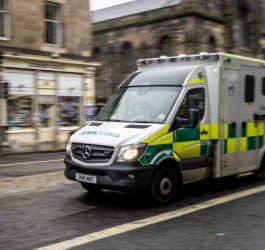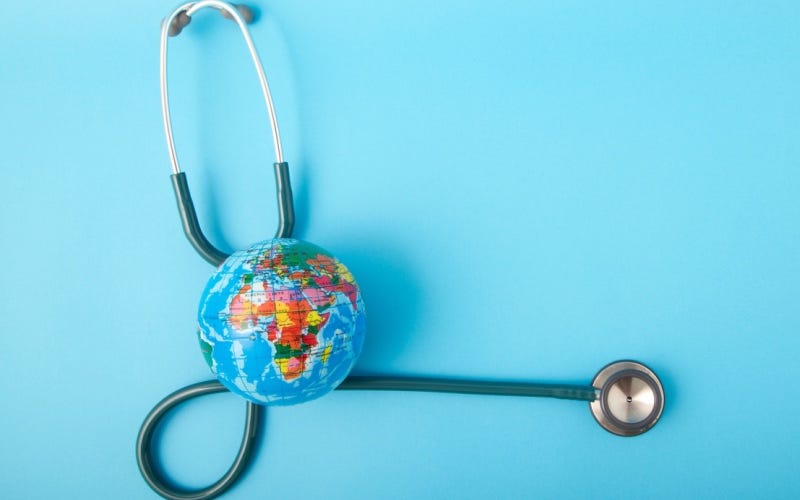What is paramedic science?

Paramedic science is the field that aspiring first responders study before becoming professional paramedics. Through paramedic science, paramedics learn how to provide emergency medical care outside of a hospital environment, as well as how to work autonomously as a generalist clinician across a range of other healthcare settings.
What does a paramedic do?
Paramedics are medical professionals who assess patients and provide treatment and care in emergency situations. Also known as first responders, they are often called out in ambulances to accidents and other emergencies, and will work alongside other emergency service personnel – such as police officers and firefighters – to assess emergency situations and provide emergency care.
Paramedics are responsible for on-site clinical decision making and will provide advanced, immediate medical care to stabilise a patient before transporting them to hospital, or can treat the patient in their home. Their role might include:
-
conducting a patient assessment
-
resuscitation
-
establishing and maintaining airways, and regulating breathing
-
using a defibrillator if someone is in cardiac arrest
-
administering drugs, oxygen, or intravenous fluids and drips
-
stopping severe haemorrhages
-
stabilising broken bones and applying splints
-
cleaning wounds and treating minor injuries
-
helping to deliver babies and providing midwifery support
-
assisting people experiencing mental health problems.
According to the College of Paramedics, paramedics have a unique role that crosses healthcare, public health, social care, and public safety – and the necessity of both clinical and non-clinical skills is significant.
“Paramedics are highly trained medical practitioners, who make life-saving decisions under pressure, but also put patients and their families at ease during difficult situations,” states the Universities and Colleges Admissions Service (UCAS). “Combining social skills with vast medical knowledge is a unique ability, and one that paramedic science students master during their degree.”
What is the difference between a paramedic and a doctor?
Paramedics and doctors both serve important roles in healthcare, but these roles are distinct from one another:
-
Training. Paramedics train for approximately three to four years, while doctors study for approximately six years full-time before undertaking a two-year general training foundation programme and then completing further training in their specialist area of medicine.
-
Length of care. A paramedic’s job is to treat a patient immediately on-site with urgent care, or stabilise and then transport them quickly to hospital for care by a doctor or wider healthcare team. A doctor, meanwhile, is responsible for long-term patient care: diagnosing them, conducting further tests and examinations, determining treatments or life support options, and so on.
-
Areas of specialisation. Paramedics may work as part of a traditional ambulance service paramedic or emergency medical technician (EMT) paramedic, or they may specialise in a specific area of paramedic science, such as firefighting paramedics or air and sea rescue. Doctors, on the other hand, specialise in areas specific to medicine, such as cardiology, radiology, paediatrics, gynaecology, and so on.
What is the difference between a paramedic and a nurse?
While paramedics and nurses are both essential, frontline medical professionals who treat patients directly, there are some significant differences in their roles:
-
Location. Paramedics provide pre-hospital care and treat patients away from traditional primary care settings, such as at the sites of accidents and emergencies, or in patient’s homes, while nurses typically work with patients in hospitals, GP offices, and other medical facilities.
-
Responsibilities. The roles of paramedics and nurses have some key differences in terms of responsibilities. For example, paramedics drive ambulances and transport patients – something a nurse does not do. A nurse, on the otherhand, oversees some of the fundamentals of ongoing healthcare, such as managing vaccinations and other routine clinics.
-
Collaborative relationships. Paramedics typically collaborate with other emergency service personnel at the scene of emergencies. Nurses, meanwhile, typically collaborate with other healthcare services and professionals as part of their standard clinical practice.
Careers in paramedic science
A career in paramedic science is a rewarding one – every day, it can mean the difference between life and death for the people a paramedic treats. In the UK, paramedics are among the 14 different Allied Health Professions (AHPs), which make up the third-largest workforce in the NHS. The NHS is the largest employer of paramedics, but there are also roles available with:
-
private ambulance services and other private healthcare providers
-
on-site events, such as sporting matches, concerts and festivals, and film and TV sets
-
The British Armed Forces
-
HM Prison Service
-
occupational health services
-
worksites with a higher health and safety risk, such as those in construction or oil and gas exploration.
What is required for a career in paramedic science?
There are a few different routes into a paramedic career. For example, there are apprenticeships and trainee schemes available alongside the traditional route via university.
According to NHS Health Careers, paramedics typically need to:
-
study an approved BSc Paramedic Science course, which includes a mix of studying theory and learning practical skills. Entry requirements for these degrees are usually two or three A levels, including a science subject, and five GCSEs (minimum Grade 4/Grade C) including English language, maths, and science – or equivalent qualifications, such as a BTEC, equivalent Scottish or Irish qualification, and so on
-
complete paramedic practice placements with ambulance services, or clinical placements, to gain work experience as part of their higher education studies
-
register as a qualified paramedic with the Health and Care Professions Council (HCPC).
Paramedics will also need a valid driving licence.
Advance your career in healthcare
Develop your knowledge in evidence-based practice and person-centred health and social care with the 100% online MSc Nursing at Queen Margaret University. Delivered through Queen Margaret University’s Division of Nursing and Paramedic Science, this flexible postgraduate programme is ideal for an international field of professionally registered nurses who are working for health institutions from a range of health and wellbeing settings. It aims to broaden your understanding of your role as a registered nurse and provides opportunities to learn in different contexts as part of your professional development.
This Master’s course is delivered entirely online, so you can learn from anywhere in the world and complete your studies around your current professional and personal commitments. For further information about start dates, modules and coursework, entry requirements, tuition fees, and English language requirements such as IELTS, please visit the university website.












The information below is required for social login
Login to your Account